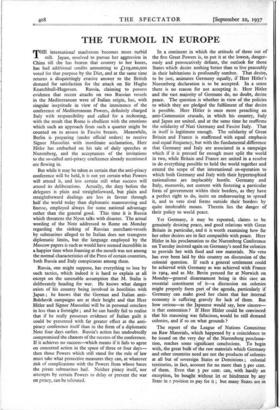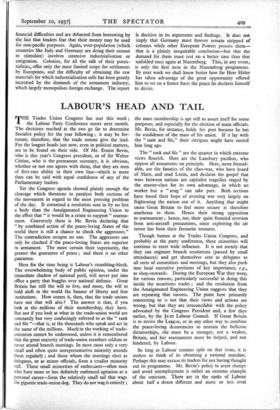THE TURMOIL IN EUROPE
THE international maelstrom becomes more -turbid still. Japan, resolved to pursue her aggression in China till she has beaten that country to her knees, has had additional credits amounting to £119,000,000 voted for that purpose by the Diet, and at the same time returns a disquietingly evasive answer to the British demand for satisfaction for the attack on Sir Hughe Knatchbull-Hugessen. Russia, claiming to possess evidence that recent attacks on two Russian vessels in the Mediterranean were of Italian origin, has, with singular ineptitude in view of the imminence of the conference of Mediterranean Powers, definitely charged Italy with responsibility and called for a reckoning, with the result that Rome is ebullient with the emotions which such an approach from such a quarter might be counted on to arouse in Fascist breasts. Meanwhile, Berlin is preparing (under official orders) to receive Signor Mussolini with inordinate acclamation, Herr Hitler has embarked on his tale of daily speeches at Nuremberg, and the acceptances of the invitations to the so-called anti-piracy conference already mentioned are flowing in.
But while it may be taken as certain that the anti-piracy conference will be held, it is not yet certain what Powers will attend it, and less certain still what success will attend its deliberations. Actually, the duty before the delegates is plain and straightforward, but plain and straightforward dealings are less in favour through half the world today than diplomatic manoeuvring and finesse, employed always for some national advantage rather than the general good. This time it is Russia which threatens the Nyon talks with disaster. The actual wording of the Note addressed to Rome on Monday regarding the sinking of Russian merchant-vessels by submarines alleged to be Italian does not transgress diplomatic limits, but the language employed by the Moscow papers is such as would have seemed incredible in a happier time when foaming at the mouth was not among the normal characteristics of the Press of certain countries, both Russia and Italy conspicuous among them.
Russia, one might suppose, has everything to lose by such tactics, which indeed it is hard to explain at all except on the untenable assumption that M. Stalin is deliberately heading for war. He knows what danger exists of his country being involved in hostilities with Japan ; he knows that the German and Italian anti- Bolshevik campaigns are at their height and that Herr Hitler and Signor Mussolini will be in personal conclave in less than a fortnight ; and he can hardly fail to realise that if he really possesses evidence of Italian guilt it could be presented with far greater effect at the anti- piracy conference itself than in the form of a diplomatic Note four days earlier. Russia's action has undoubtedly compromised the chances of the success of the conference. If it achieves no success—which means if it fails to agree on concerted action in the space of three or four days— then those Powers which still stand for the rule of law must take what protective measures they can, at whatever risk of complications with the Powers from whose bases the pirate submarines hail. Neither piracy itself, nor attempts by certain Powers to delay or prevent the war on piracy, can be tolerated. In a continent in which the attitude of three out of the five Great Powers is, to put it at the lowest, danger- ously and provocatively defiant, the outlook for those States which desire nothing better than to live peaceably in their habitations is profoundly sombre. That desire, to be just, animates Germany equally, if Herr Hitler's Nuremberg declaration is to be accepted. In a sense there is no reason for not accepting it. Herr Hitler and the vast majority of Germans do, no doubt, desire peace. The question is whether in view of the policies to which they are pledged the fulfilment of that desire is possible. Herr Hitler is once more preaching an anti-Communist crusade, in which his country, Italy and Japan are united, and at the same time he reaffirms the solidarity of Nazi Germany and Fascist Italy. That in itself is legitimate enough. The solidarity of Great Britain and France is reaffirmed with equal emphasis and equal frequency, but with the fundamental difference that Germany and Italy are associated in a campaign which if it is pressed far enough must split the world in two, while Britain and France are united in a resolve to do everything possible to hold the world together and extend the scope of that international co-operation to which both Germany and Italy with their hypertrophied nationalisms are implacably hostile. Germany and Italy, moreover, not content with fostering a particular form of government within their borders, as they have a perfect right to do, insist on endeavouring to spread it, and to veto rival forms outside their borders by quite intolerable means. Therein lies the danger of their policy to world peace.
Yet Germany, it may be repeated, claims to be genuinely desiring peace, and good relations with Great Britain in particular, and it is worth examining how far her other desires are in fact compatible with peace. Herr Hitler in his proclamation to the Nuremberg Conference on Tuesday insisted again on Germany's need for colonies to provide her with food and raw materials. No veto has ever been laid by this country on discussion of the colonial question. If such a general settlement could be achieved with Germany as was achieved with France in 1904, and as Mr. Bevin pressed for at Norwich on Monday—general disarmament being in this case an essential constituent of it—a discussion on colonies might properly form part of the agenda, particularly if Germany can make good her claim that her internal economy is suffering gravely for lack of them. But how serious—as the Japanese would say, how sincere— is that contention ? If Herr Hitler could be convinced that his reasoning was fallacious, would he still demand colonies, and if so on what grounds ?
The report of the League of Nations Committee on Raw Materials, which happened by a coincidence to be issued on the very day of the Nuremberg proclama- tion, reaches some significant conclusions. To begin with, the great bulk of the raw materials which Germany and other countries need are not the products of colonies at all but of sovereign States or Dominions ; colonial territories, in fact, account for no more than 3 per cent. of them. Even that 3 per cent, can, with hardly an exception, be bought without let or hindrance by any State in z position to pay for it ; but many States are in financial difficulties and are debarred from borrowing by the fact that lenders fear that their money may be used for non-pacific purposes. Again, over-population (which countries like Italy and Germany are doing their utmost to stimulate) involves intensive industrialisation or emigration. Colonies, for all the talk of their poten- tialities,. offer only the most limited scope for settlement by Europeans, and the difficulty of obtaining the raw materials for which industrialisation calls has been greatly increased by the demands of the armament industry, which largely monopolises foreign exchange. The report is decisive in its arguments and findings. It does not imply that Germany must forever remain stripped of colonies while other European Powers possess them— that is a plainly inequitable conclusion—but that the demand for them must rest on a better case than that unfolded once again at Nuremberg. This, in any event, is only the first item in the Nuremberg programme. By next week we shall know better how far Herr Hitler has taken advantage of the great opportunity offered him to set on a firmer basis the peace he declares himself to desire.











































 Previous page
Previous page